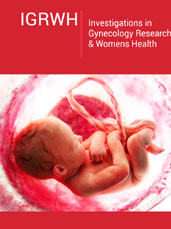- Submissions

Abstract
Investigations in Gynecology Research & Womens Health
Mayer- Rokitansky-Kuster-Hauser Syndrome - A Puzzling Case!
-
Open or CloseSuresh Kishanrao*
Family Physician & Public Health Consultant, India
*Corresponding author:Suresh Kishanrao, Family Physician & Public Health Consultant, Bengaluru, Karnataka, India
Submission:January 17, 2025;Published: January 29, 2025
Abstract
Mayer-Rokitansky-Kuster-Hauser (MRKH) syndrome is an uncommon congenital malformation of the female genital tract during the prenatal development due to lack mullerian hormone. The aetiology is polygenic multi-factorial; occasionally, due to a genetic mutation or deletion of genes on chromosome 16 MRKH occurs when the Müllerian duct derivatives don’t fuse during foetal development and results in lack of mullerian hormone which is crucial for development of vagina and uterus. As the ovaries, are formed separately, they are normal. Patients with MRKH have normal breast development, sexual body proportions, body hair, and hymenal tissue. They have 46 XX as karyotype genetics, but pre-natal genetic testing can’t detect these defects. As MRKH syndrome impacts females’ anatomy, treatment involves i) lengthening vagina, either through coital dilation or through a dilator over a period of six months. If dilatation fails surgical neovagina construction is the next option and opt for IVF & Surrogacy for bearing a baby if they desire to have children of their own need to go for uterine transplantation. Uterine transplantation has evolved since 2011 & established globally by 2017.
Materials and methods: This article is based on case reporting to one of the tertiary care hospitals in a professional lady of 28 years in November-December 2024 and relevant literature review.
Outcome: The patient was hospitalized for a week and neovagina reconstruction was done successfully using tissues from her groin. At follow-up after one month, she was normal with vaginal sensation. She and her family were informed that she can’t bear a child of her own due to want of uterus, but her healthy ovaries will have ovum, and she can look forward for baby with surrogate uterus. In a recent follow up on 10 January 2025 she was looking exceptionally well and confident hoping for a bright future.
Keywords:Vulva; Vagina; Cervix; Uterus; Ovaries; Fallopian tubes; Clitoris; Xray; MRKH dilatation; Neovagina; Uterus transplantation
Abbreviations:MRKHS: Mayer-Rokitansky-Kuster-Hauser-Syndrome; MH: Mullerian Hormone; MRI: Magnetic Resonance Imaging; AMAFB: Assigned as Female at Birth; AMAB: Assigned as Male at Birth
 a Creative Commons Attribution 4.0 International License. Based on a work at www.crimsonpublishers.com.
Best viewed in
a Creative Commons Attribution 4.0 International License. Based on a work at www.crimsonpublishers.com.
Best viewed in 








.jpg)






























 Editorial Board Registrations
Editorial Board Registrations Submit your Article
Submit your Article Refer a Friend
Refer a Friend Advertise With Us
Advertise With Us
.jpg)






.jpg)














.bmp)
.jpg)
.png)
.jpg)










.jpg)






.png)

.png)



.png)






